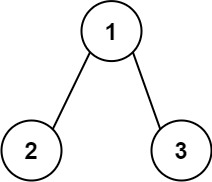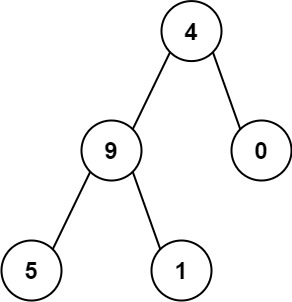You are given the root of a binary tree containing digits from 0 to 9 only.
Each root-to-leaf path in the tree represents a number.
- For example, the root-to-leaf path
1 -> 2 -> 3represents the number123.
Return the total sum of all root-to-leaf numbers. Test cases are generated so that the answer will fit in a 32-bit integer.
A leaf node is a node with no children.
Example 1:

Input: root = [1,2,3] Output: 25 Explanation: The root-to-leaf path1->2represents the number12. The root-to-leaf path1->3represents the number13. Therefore, sum = 12 + 13 =25.
Example 2:

Input: root = [4,9,0,5,1] Output: 1026 Explanation: The root-to-leaf path4->9->5represents the number 495. The root-to-leaf path4->9->1represents the number 491. The root-to-leaf path4->0represents the number 40. Therefore, sum = 495 + 491 + 40 =1026.
Constraints:
- The number of nodes in the tree is in the range
[1, 1000]. 0 <= Node.val <= 9- The depth of the tree will not exceed
10.
My Solution:
# Definition for a binary tree node. # class TreeNode: # def __init__(self, val=0, left=None, right=None): # self.val = val # self.left = left # self.right = right class Solution: def sumNumbers(self, root: Optional[TreeNode]) -> int: def paths(root) -> list: if not root.left and not root.right: return [[str(root.val)]] elif root.left and not root.right: return [[str(root.val)] + path for path in paths(root.left)] elif root.right and not root.left: return [[str(root.val)] + path for path in paths(root.right)] else: return [[str(root.val)] + path for path in paths(root.left)] + [[str(root.val)] + path for path in paths(root.right)] path_strs = [''.join(path) for path in paths(root)] return sum([int(path_str) for path_str in path_strs])





 浙公网安备 33010602011771号
浙公网安备 33010602011771号